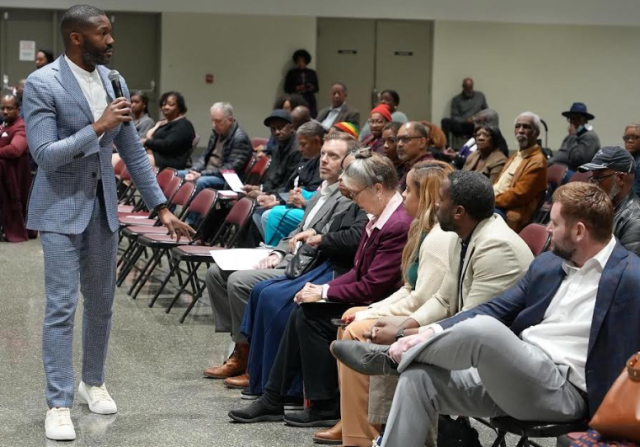
By Keisa Sharpe-Jefferson | For The Birmingham Times
Hundreds packed the second floor of the Boutwell Auditorium on Monday to hear Birmingham Mayor Randall Woodfin discuss the city’s budgeting process during a 2024 Budget Town Hall which lasted about two hours.
For the first hour, the mayor gave a detailed look at budget allocations — specifically what departments are funded and how that money breaks down and answered questions for the final hour.
The currently has a $554 million fiscal 2023-2024 budget which went into effect July 1, 2023.
Woodfin said blight removal and street paving are areas where he gets the most questions from residents.
“In six years, we spent about $60 million in street paving,” said Woodfin. “That’s probably the highest thing spent (in operating expenses) because it’s the number one consistent request over and over, every single year.”
The city’s fiscal year runs from July 1 to June 30 and in the current fiscal 2024 more than $437 in business taxes are expected, compared to the second highest revenue source, which is property taxes, which total nearly $36 million, he said.
“The city of Birmingham, as it relates to our ability to collect taxes in return for new city services for you and your neighbors, is heavily dependent on small businesses,” he told the audience.
The city’s number one expense is personnel, which makes up 76 percent of the budget with the remaining 24 percent going toward operating expenses, he said.
Woodfin has made no secret that he’s passionate about the city’s youth programs.
Per the data he shared during the Town Hall, Birmingham Promise (a program connecting students with workforce experience and post-secondary educational opportunities) gets $2 million; conflict resolution/violence intervention, $1 million (Common Ground program); and mental health and Safe Haven programs get $500,000 each.
He also pointed to $1 million for financial literacy programs. “You may say why? … The answer is very simple,” said Woodfin. “In a considerable amount of your neighborhoods, you have predatory check cashing places. It is my desire to put them out of business because they prey on poor people in our city. Maybe the long-term play is to make the necessary investments in the next generation … they’re more likely to walk past one of those places,” he said.
Residents were mostly pleased by the presentation. Gerald Gilmore came with a wide-ranging view of the city. He grew up in Titusville, lives in South Roebuck community; graduated from Ramsay High School and Miles College (with a major in Business Administration) and retired from AT&T.
Gilmore said he found the budget town hall meeting “very informative” and came “to see how the city operates and where the money is going.”
High on Gilmore’s radar are crime and education, and said he would like to more money contributed toward these efforts along with more “neighborhood and community involvement.”
Thomasine Jackson serves as the East Thomas Neighborhood President, the same community that she said she was born and raised. “As a neighborhood president, I need to know what’s going on with the budget and what’s going to happen,” she said.
Jackson said it was “a fair meeting” and added she wanted to know more about budgeting for her neighborhood.
Citing a number of questions related to Birmingham’s specific neighborhoods, in the interest of time, Woodfin and his staff assured community leaders that, rather than lengthen the town hall, someone from the mayor’s staff would contact them regarding specific questions.
As residents left the Boutwell Auditorium they were given a Budget Handbook that came in English and Spanish.
Updated at 9:14 a.m. on 3/20/2024 to include amount of 2023-24 fiscal budget.




